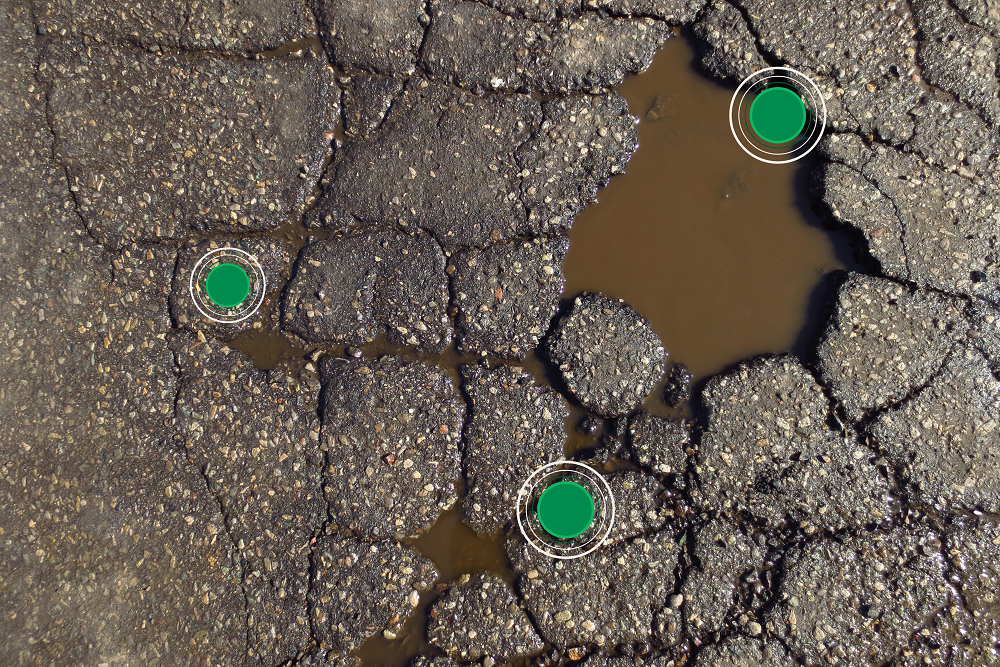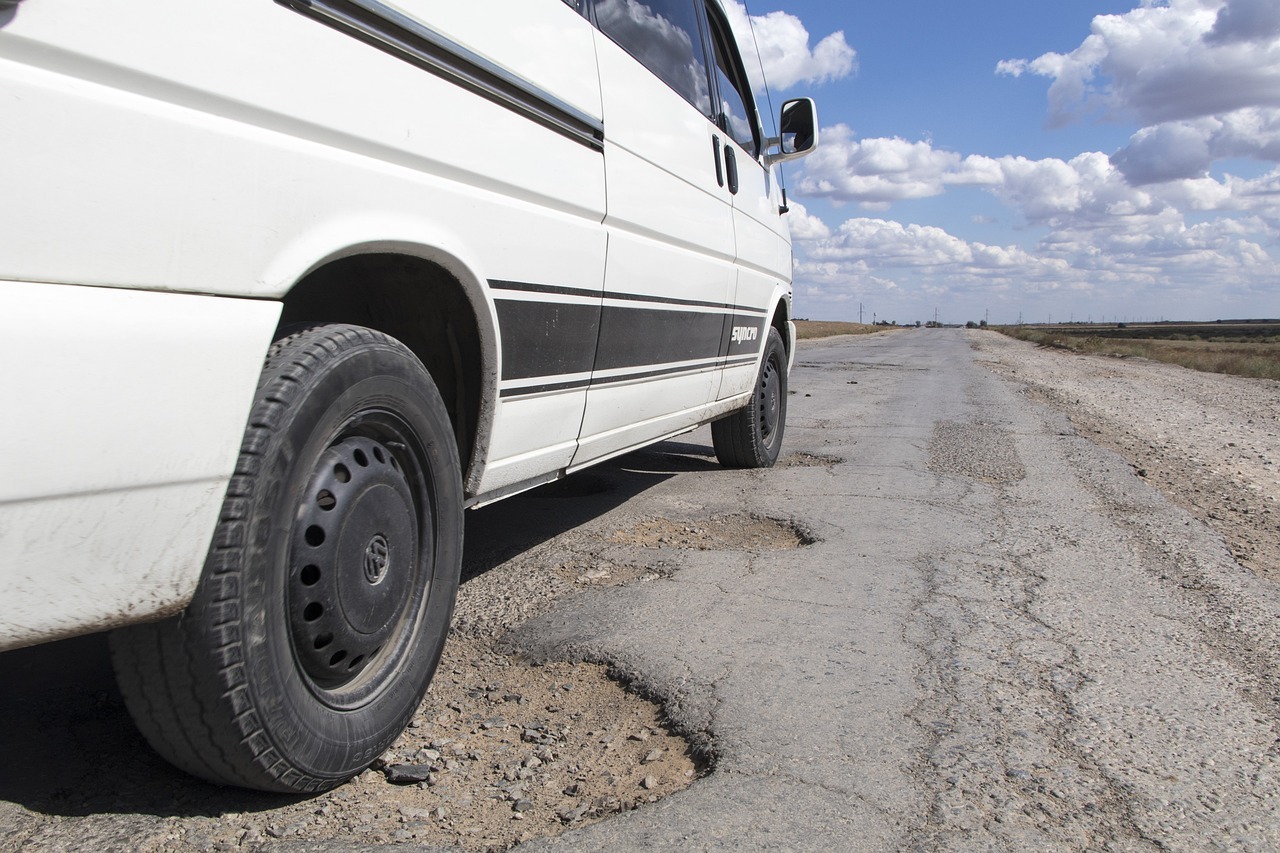
Frequently asked questions about potholes in South Africa
Ah, potholes! Those pesky, tire-wrecking nuisances that seem to pop up overnight. Whether you're navigating the bustling streets of Johannesburg, taking a scenic drive through the Cape Winelands, or cruising along the coast of Durban, there's no escaping the jarring experience of unexpectedly hitting one of these holes of doom. As drivers, we've all had our fair share of heart attack moments and thinking about the consequences of hitting a pothole. So, DEKRA decided to take a look at five of the most frequently asked questions about potholes in South Africa, shedding a little more light on these unwelcome road guests.
Are you worried about your tires and wheel alignment because your vehicle recently almost disappeared into a pothole? Get in touch with DEKRA and bring your car in for a Condition Report.
1. What are the common causes of potholes?
- Weather Conditions: Fluctuating weather and rainwater seepage weaken asphalt, leading to potholes.
- Poor Road Maintenance: Delays or lack of regular maintenance exacerbate the deterioration of road surfaces.
- Traffic Volume and Load: High traffic and heavy vehicles stress roads, causing faster wear and tear.
- Substandard Construction Materials: Inferior asphalt mix or construction methods make roads more prone to damage.
- Underlying Soil and Drainage Issues: Poor drainage and unstable soil types undermine road stability.
- Ageing Infrastructure: As roads age, they naturally become more susceptible to damage, including potholes.
2. What kind of damage can potholes cause to my vehicle?
- Tire Damage: Hitting a pothole can lead to punctures, sidewall bulges, or even a flat tire.
- Wheel Rim Damage: They can dent or bend your rims, making your ride less smooth.
- Suspension and Alignment: It can mess with the alignment or damage the suspension components.
- Undercarriage Damage: If a pothole is deep enough, it can scrape or damage the bottom of your car.
- Exhaust System Issues: Your car's exhaust pipes can get damaged, leading to potential leaks or louder engine noises.
- Body and Paint Damage: On lower cars especially, potholes can lead to scratches or dents on the bodywork.
3. Are there any preventative measures I can take to avoid pothole damage?
- Eyes on the Road: Always keep a keen eye on the road ahead. Spotting a pothole early gives you more time to safely manoeuvre around it.
- Keep Those Tires Pumped: Maintaining the right tire pressure can act as a cushion against the impact. Too low or too high, and you're asking for trouble.
- Avoid Puddles: After rain, puddles can disguise potholes. Best to steer clear when you can.
- Hold the Wheel Firmly: If you're about to hit a pothole, grip your steering wheel properly to maintain control of your vehicle.
- Regular Check-ups: Just like you'd visit a doctor for a check-up, get your car's alignment and suspension checked regularly at DEKRA. It'll help spot issues before they become big problems.
- Know Your Route: If you're familiar with where the potholes are on your regular routes, you can be prepared to avoid them well in advance.
- Slow Down, But Don't Slam on the Brakes: If you see a pothole and can't avoid it, slow down and don't try to brake directly over it since this can actually cause more damage. Instead, release the brakes just before you hit it.
- Keep a Safe Following Distance: This gives you a clearer view of the road ahead and more time to react. Plus, if the car in front of you hits a pothole, you'll get a heads-up.

Image credit: Jacob Ode from Pixabay
4. What should I do if my car gets damaged by a pothole?
Immediate Safety Measures
First and foremost, if you've hit a pothole in South Africa and something feels off, it's crucial to prioritise safety. Gently steer your vehicle to a safe spot and pull over. Once you're safely parked, you can assess any obvious damage, especially to your tires, to ensure it's safe to continue driving.
Document Everything
In today's digital age, your smartphone is one of your best tools. Take clear photos of the pothole that caused the damage, as well as the specific damage to your vehicle. Think of it as gathering evidence. This documentation can be invaluable, especially if you decide to pursue a claim.
Reporting and Claims
You'll be doing your part when you report that menacing pothole to your local municipality or road authority even when they don't get fixed immediately. By doing so, you're not only looking out for yourself but also helping other drivers avoid the same fate. In some cases, you might have the option to claim from either SANRAL (national roads) or the local government responsible for the road where the damage happened. It's important to note that the claims from SANRAL or local government can take time to be processed and paid out. If the damage is significant, consider contacting your insurance provider to see if you're covered.
Get a DEKRA Condition Report
Even if the damage isn't immediately apparent, it will always be a wise move to visit DEKRA and have the condition of your vehicle assessed. We can check out the finer details on your vehicle, like the alignment and suspension, to ensure that everything is still in tip-top shape. Remember, some damage might not be visible but can lead to bigger problems down the road. This fact alone makes a visit to your closest DEKRA branch something to put at the top of your to-do list.
Click/tap here to find out more about the DEKRA Condition Report.
5. Are certain areas in South Africa more prone to potholes?
South Africa's diverse landscape plays a significant role in the prevalence of potholes. Areas with heavy rainfall, such as KwaZulu-Natal and parts of the Eastern Cape, are particularly vulnerable. Rainwater seeping into tarmac weakens the road, leading to the formation of potholes. Additionally, while the freeze-thaw cycle isn't a common culprit like in colder countries, places with extreme temperature fluctuations aren't spared from pothole woes. On the urban front, bustling cities like Johannesburg and Cape Town grapple with potholes, with heavy traffic exacerbating the wear and tear. However, rural areas often face a tougher challenge. Limited road maintenance budgets, coupled with roads that might not meet urban standards, often result in a rougher ride.
The state of road maintenance also varies across regions and municipalities. Those with constrained budgets or administrative hurdles often struggle to keep up with necessary repairs. Consequently, even if two areas experience similar weather and traffic, the region with more diligent maintenance will fare better in the battle against potholes in South Africa. Another factor to consider is the age of the infrastructure. Some parts of South Africa boast older road networks, and as these roads age, they're more prone to wear and tear, which will inevitably lead to pesky potholes.
Navigating the maze of potholes in South Africa can be a daunting task for any driver. From understanding their origins to managing the aftermath of an unfortunate encounter, it's clear that these road nuisances are more than just superficial blemishes. They impact our daily commutes, the health of our vehicles, and even our safety. But knowledge is power, and being informed is the first step to managing this issue. If you're ever in doubt about the condition of your vehicle after a run-in with a pothole, don't hesitate. Reach out to DEKRA for a comprehensive Condition Report. Let's work together to ensure our rides remain smooth, safe, and pothole-free.
Read related article:
All about the DEKRA Condition Report
Road Safety Tips: Navigate South African Roads Safely
Buying new tyres? Here's How To Choose the Right Ones
Beat the Summer Rain: Ensure Your Windscreen Wipers are Ready
Weather-Related Driving Hazards: How to Stay Safe on the Road